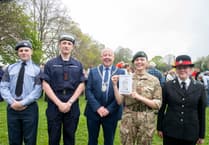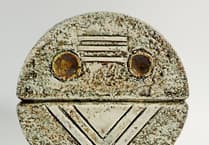THE terrible case of child abuse that inspired Agatha Christie’s The Mousetrap features in a new documentary on the legendary crime writer, presented by historian Lucy Worsley.
But what is less well known is that the young boy who witnessed the horrific treatment that led to his 12-year-old brother’s death, and gave the evidence that jailed their cruel foster parents, found the love and care to rebuild his life at a Forest agricultural school run by monks.
The case at Stafford Crown Court took over the front pages of the national press in early 1945, even in the closing battles of WWII, and led to changes in the law.
Reginald Gough was jailed for manslaughter, later upgraded to murder by the appeal court, having inflicted savage beatings on Dennis O’Neill and virtually starved him to death at his Shropshire farm.
Younger brother Terry, who witnessed and suffered the brutal treatment, gave three days of harrowing evidence at the trial that convicted Gough and his wife Esther, who was jailed for six months for neglect.
And still alive today in his late 80s, and living in his home city Newport, he wrote his own account of the tragic case 12 years ago, in his best selling book Someone to Love Us, which has sold tens of thousands of copies.
The great-grandfather admitted at the time of the publication that he had only recently learnt that the creator of Poirot and Miss Marple had used it as inspiration for her whodunnit revenge story, the longest running continuous stage play in the world, which reached its 70th anniversary this year at St Martin’s Theatre in the West End.
But asked what he would say to his abuser if he had met him, he said: “The answer is precisely nothing. People have said, would you not want to get at him? But that would put me on his level. That was a bad part of my life.”
It was at Blaisdon Hall near Longhope in the early 1950s where Terry, keen on farming and outdoor life, began to rebuild his confidence and self-esteem, revealing: “I had a good feeling about Blaisdon straight from the start. Maybe I would be treated as an adult now and would no longer feel so vulnerable and insecure.”
Indeed, the place and the Silesian monks were such a positive influence on him that he still joined annual reunions there with other boys into his 80s.
Lucy Worsley: On the Mystery Queen reveals how the court case inspired Christie’s block-buster theatre hit, and how she had to change the title when it transferred from a radio play to stage.
The documentary was aired last week on BBC2 and is available on BBC iPlayer. You can also listen to an interview with Terry at www.bbc.co.uk/programmes/b0125kr0.





Comments
This article has no comments yet. Be the first to leave a comment.